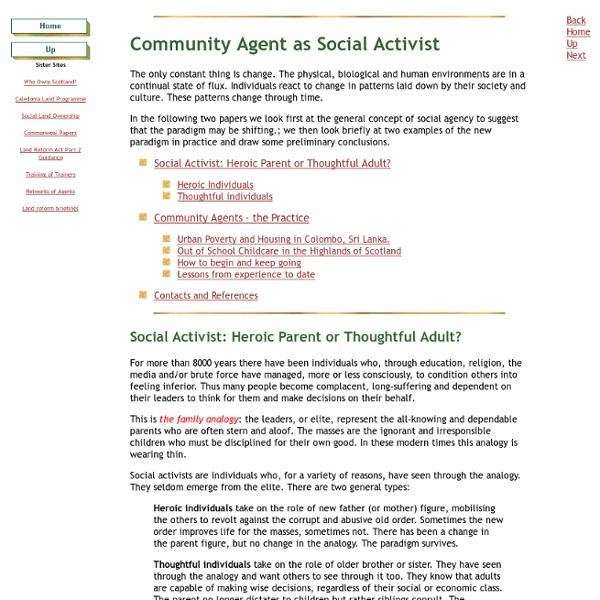Why Social Media Is Reinventing Activism
The argument that social media fosters feel-good clicking rather than actual change began long before Malcolm Gladwell brought it up in the New Yorker — long enough to generate its own derogatory term. “Slacktivism,” as defined by Urban Dictionary, is “the act of participating in obviously pointless activities as an expedient alternative to actually expending effort to fix a problem.” If you only measure donations, social media is no champion.
Social Activism
Careers in Social Activism--An Introduction Social activism is an intentional action with the goal of bringing about social change. If you feel strongly about a cause and are working towards a change, you could be considered an activist. An activist is anyone who is fighting for change in society. An activist can be a student attending a rally against tuition increase, a politician fighting against international human rights abuses or a mother of a child killed by a drunk driver talking to students about drinking and driving. Social activists consider the larger picture – how can they find ways to end injustice and to create strong communities which encourage economic, social and psychological health.
Is Meme Activism the Next Big Thing in Social Change?
Social media
Diagram depicting the many different types of social media There are many effects that stem from internet usage. According to Nielsen, internet users continue to spend more time with social media sites than any other type of site. At the same time, the total time spent on social media in the U.S. across PC and mobile devices increased by 99 percent to 121 billion minutes in July 2012 compared to 66 billion minutes in July 2011.[5] For content contributors, the benefits of participating in social media have gone beyond simply social sharing to building reputation and bringing in career opportunities and monetary income, as discussed in Tang, Gu, and Whinston (2012).[6] Classification of social media[edit] Social media technologies take on many different forms including blogs, business networks , enterprise social networks, forums, microblogs, photo sharing, products/services review, social bookmarking, social gaming, social networks, video sharing and virtual worlds.[7]
How our activists view social media
Opposition politician Amr Badr from Egypt Modern communication strategy platforms such as twitter and facebook had a great influence on protest movements as they facilitated reaching a larger number of protesters and eased organizing protests in addition to media coverage. However, it is hard to reach older demographics, the poor and illiterate people who cannot or do not have access to such communication platforms.
Activism, social and political
Published in Gary L. Anderson and Kathryn G. Herr (eds.), Encyclopedia of Activism and Social Justice (Thousand Oaks, CA: Sage, 2007), pp. 19-27 Brian Martin Go to
Is 'clicktivism' destroying meaningful social activism?
Twitter, Facebook, and social activism
At four-thirty in the afternoon on Monday, February 1, 1960, four college students sat down at the lunch counter at the Woolworth’s in downtown Greensboro, North Carolina. They were freshmen at North Carolina A. & T., a black college a mile or so away. “I’d like a cup of coffee, please,” one of the four, Ezell Blair, said to the waitress.
Turkey protests: how activists stay one step ahead with social media
She will receive links to maps only visible to fellow activists that show the location of makeshift clinics in houses and even in restaurants' basements, and can watch live streams of protests on the Ustream service if she is at home. She told the Telegraph: "It has had a massive impact, and if it wasn't for social media we wouldn't have the right information on anything. It's been our saviour."



